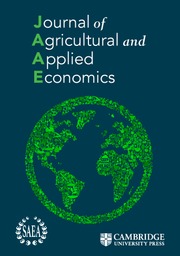Crossref Citations
This article has been cited by the following publications. This list is generated based on data provided by Crossref.
Robinson, Derrick
Hite, Diane
and
Hanson, Terrill
2016.
Recreational Demand of Visits to the Gulf Coast Region.
SSRN Electronic Journal,
Court, Christa D.
Hodges, Alan W.
Clouser, Rodney L.
and
Larkin, Sherry L.
2017.
Economic impacts of cancelled recreational trips to Northwest Florida after the Deepwater Horizon oil spill.
Regional Science Policy & Practice,
Vol. 9,
Issue. 3,
p.
143.
Andrianto, Agus
Komarudin, Heru
and
Pacheco, Pablo
2019.
Expansion of Oil Palm Plantations in Indonesia’s Frontier: Problems of Externalities and the Future of Local and Indigenous Communities.
Land,
Vol. 8,
Issue. 4,
p.
56.
Solo-Gabriele, Helena M.
Fiddaman, Tom
Mauritzen, Cecilie
Ainsworth, Cameron
Abramson, David M.
Berenshtein, Igal
Chassignet, Eric P.
Chen, Shuyi S.
Conmy, Robyn N.
Court, Christa D.
Dewar, William K.
Farrington, John W.
Feldman, Michael G.
Ferguson, Alesia C.
Fetherston-Resch, Elizabeth
French-McCay, Deborah
Hale, Christine
He, Ruoying
Kourafalou, Vassiliki H.
Lee, Kenneth
Liu, Yonggang
Masi, Michelle
Maung-Douglass, Emily S.
Morey, Steven L.
Murawski, Steven A.
Paris, Claire B.
Perlin, Natalie
Pulster, Erin L.
Quigg, Antonietta
Reed, Denise J.
Ruzicka, James J.
Sandifer, Paul A.
Shepherd, John G.
Singer, Burton H.
Stukel, Michael R.
Sutton, Tracey T.
Weisberg, Robert H.
Wiesenburg, Denis
Wilson, Charles A.
Wilson, Monica
Wowk, Kateryna M.
Yanoff, Callan
and
Yoskowitz, David
2021.
Towards integrated modeling of the long-term impacts of oil spills.
Marine Policy,
Vol. 131,
Issue. ,
p.
104554.
Bessette, Douglas
Rutty, Michelle
Gunn, Grant
Tarabara, Volodymyr
and
Richardson, Robert
2021.
The perceived risk of the Line 5 Pipeline and spills under ice.
Journal of Great Lakes Research,
Vol. 47,
Issue. 1,
p.
226.
Ferreira, João-Pedro
Bijen Saha, Bijeta
Carrero, Gabriel Cardoso
Kim, Jinwon
and
Court, Christa
2023.
Impacts of red tide in peer-to-peer accommodations: A multi-regional input-output model.
Tourism Economics,
Vol. 29,
Issue. 3,
p.
812.
Macdonald, Catherine
Turffs, Dylann
McEntee, Kela
Elliot, Jessica
and
Wester, Julia
2023.
The relationship between tourism and the environment in Florida, USA: A media content analysis.
Annals of Tourism Research Empirical Insights,
Vol. 4,
Issue. 1,
p.
100092.


